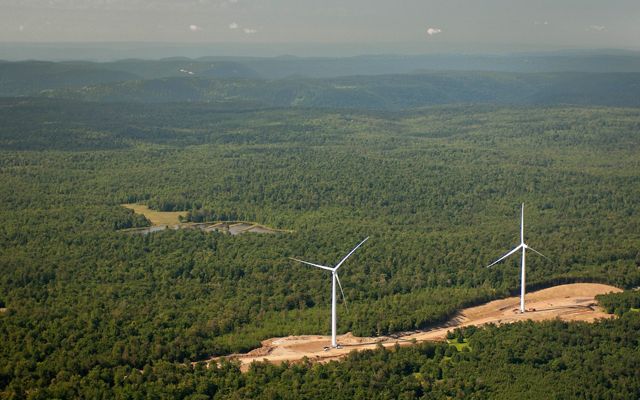For the U.S., the Paris Agreement Is an Opportunity, Not a Burden
Critics of the agreement haven’t updated their talking points and it shows.
When U.S. President Biden signed an Executive Order on his first day in office signaling the re-entry of the United States into the Paris Agreement, the responses from critics were predictable. Those that stand against the Paris Agreement have a standard set of talking points, dated soundbites that are out of touch with the current reality.
Two misconceptions stand out. Contrary to statements of naysayers, the Paris Agreement is not a top-down imposition of U.N. mandates. And addressing the climate crisis does not present immense economic costs.
The Pen is in Our Hand
From the beginning, the drafters of the Paris Agreement understood that the international community is about collaboration, not control. Sovereign nations cannot be forced to act. But they can and should work together to tackle certain kinds of global problems. A problem like the climate crisis —systemic, planet-wide, with urgently increasing impacts—is exactly the sort of problem requiring international cooperation.
Paris sets a global goal for emission reductions, but it is up to every signatory to decide for itself what its contribution to that goal is going to be. Each party supplies to the Secretariat of the United Nations Framework Convention on Climate Change (UNFCCC) a Nationally Determined Contribution (NDC)—a commitment to an emissions reduction program. This is the binding part of the Agreement. The Agreement asks that a country’s NDC be ambitious, to make continued progress to the overall goal, and to be in line with the intent of the Agreement. But countries themselves determine these details. Nearly all nations, including China, are signatories to the Agreement.
Quote
The idea that the Paris Agreement is some sort of straitjacketing of American sovereignty is simply inaccurate.
The United States decides how much of a reduction of greenhouse gases it will commit to. The United States decides where those reductions will come from and how they will be achieved. The United States decides the timetable. Aside from the initial commitment to participation and submitting a new NDC each 5 years, every other decision of substance with respect to the Paris Agreement lies firmly in the hands of the United States. The pen is in our hands. The idea that the Paris Agreement is some sort of straitjacketing of American sovereignty is simply inaccurate.
Americans want to see greenhouse gas pollution reduced. By wide margins, in fact. Fully three in four Americans want to see carbon dioxide managed as a pollutant, and 65 percent of Americans want to see the federal government do more to protect air quality. Thus, the only thing the Paris Agreement requires the United States to do (come up with a plan to reduce air pollutants that cause climate change) is the very thing that Americans consistently and clearly say in public opinion surveys they want their government to do.
The Whole World Is Engaged, Including China
For those who think that the United States shouldn’t have to engage first on emissions reductions until the rest of the world, and especially China, does so first, there’s good news. The world is engaged, including China. In fact, many of our closest competitors in the global economy are ahead of us at this point.
Yes, China is still the top emitter of climate change pollutants, by a wide margin, and still needs to address its problems with coal-fired generation. But in September of 2020, China announced that it would reach peak carbon emissions ahead of its original goal of 2030, and that it would achieve carbon neutrality by 2060. China’s efforts to meet these goals are underway. China leads the world at building out its solar and wind energy capacity and is now the global leader in solar panel production. China still has a lot to undertake, but it has demonstrated commitment to the process.

If China is engaged, the European Union is committed and reaping the rewards. The EU successfully adopted all the legislation necessary to meet its Paris Agreement commitments back in 2018, and set forth an even more aggressive set of targets last year. For the first time in 2020, renewable energy is now the largest source of energy for the EU. Wind and solar energy extended their dominance over coal, driven in part by cost-effectiveness, in the EU’s energy mix, after outpacing it last year for the first time. Carbon intensity has fallen from 317 grams of CO2 per kilowatt-hour in 2015 to 226 grams in 2020. The United Kingdom, putting forth its first Paris Agreement target since Brexit last year, committed to emissions reductions that would put it squarely on the path to meeting the overall goals of the Paris Agreement.
Put simply, much of the rest of the world, including China, have demonstrated that they are committed to the Paris Agreement framework and are using climate action to lead the business world in a transition to clean energy. It’s the United States that is playing catchup in climate action.
Climate Action Grows Our Economy
Almost from the moment the United States began protecting our land, air and water from pollution, the complaint has been that environmental regulations hurt the U.S. economy. Evidence generally indicates otherwise, and when it comes to meeting the challenge of climate change, economic opportunities abound for individuals, businesses and communities.
Whether its energy efficiency and fuel efficiency standards that actively save consumers and businesses money; the growing uptake of renewable energy that is creating jobs, lowering costs and building businesses; or investments in soil health and improved forest management, climate action provides economic benefits. And addressing the climate crisis will reduce risks of climate impacts that cost communities and businesses billions, costs we are already experiencing yearly.
Quote
Climate action provides economic benefits, and addressing the climate crisis reduces the risk of climate impacts that cost billions.
Before the pandemic, the top two fastest growing jobs in the U.S. were solar installer and wind turbine technician. Wind and solar energy have been cheaper than coal-fired energy for a while now, and in some parts of the country they are cheaper even than natural gas. Energy efficiency has led to a decoupling of economic growth and energy use. Demand for electric vehicles is growing and automakers are responding. General Motors has committed to 30 different electric vehicles on the market by 2025, and Ford is spending $11.5 billion on EV development by 2022.
Many companies are now committed to addressing emissions in their own businesses—making commitments to bring their operations to net zero or to source their energy from 100 percent renewable sources. Even longtime opponents of climate legislation like the U.S. Chamber of Commerce and the American Petroleum Institute have recently emerged as favoring climate action.
The time for old excuses that hold us back is over. Climate change is happening now, the impacts are affecting every corner of the nation (and globe) now, and the solutions, while many-faceted, offer an amazing opportunity for cleaner air, better choices, and economic growth. It’s time to update our thinking, and our economy, to meet the future.
Global Insights
Check out our latest thinking and real-world solutions to some of the most complex challenges facing people and the planet today.





